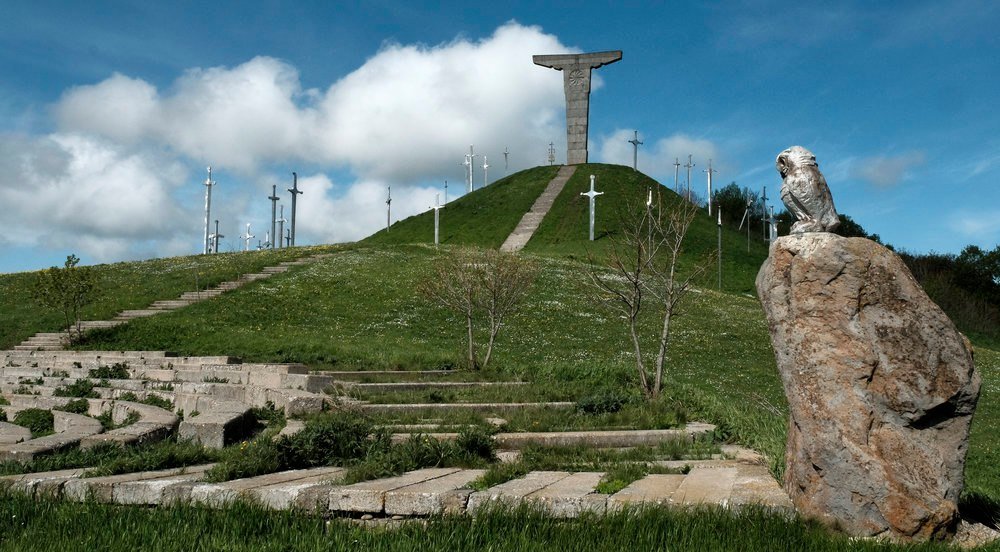Op-ed | Historians Must Turn Towards the Future
Scholars share responsibility for destructive myth-building
Our present is nothing to be excited about, and the future is dim. So we borrow hope from the past and go back in history, 900 years ago, to the era of King David IV or Queen Tamar. This is how history affects our present: promoting ephemeral nationalism, inflating our self-esteem beyond reason, it disorients our society. We, historians, bear this responsibility, and it is our duty to change how we look at history and how we teach it.
Author: Dr. Beka Kobakhidze. Professor and Co-chair of MA Program in Modern History of Georgia at Ilia State University and Georgian Studies Fellow at the Davis Center of Russian and Eurasian Studies of Harvard University
The loss of historical repairs breeds the maxims like “US can teach us nothing. We have trees of its age in our backyard.” It orients our society towards the past, more precisely towards protecting that past in the name of so-called “traditions,” many of which were – in fact – ‘created’ or ‘anointed’ in the 20th century.
And as a considerable part of our society thinks in these mental categories, politicians no longer have to talk about the future – the better way to educate our children, improve infrastructure or boost the economy. Why bother about these complex and contested policies when you can easily get ahead by claiming to defend the past?!
And so, the “David Gareji is Georgia” campaign can become the centerpiece of the election campaign. The classical writers of 19-20 centuries, like Vazha-Pshavela or Ilia Chavchavadze, can be routinely instrumentalized in everyday politics. The ruling party leaders took to labeling its opponents as “people without a motherland,” substituting the earlier iterations of this slur – “enemy of the people” or “KGB agent.” Thus, the past takes up a disproportional space in shaping citizens’ electoral decisions, not the future.
Georgia historians are largely to blame for this collective madness. In Soviet times, social sciences and humanities bore the imprint of Marxism-Leninism, and the scholars worked to solidify and glorify its key tenets. The Communist party, workers, and peasants were glorified as heroes. Feudal lords, capitalists, and the West were the villains. Their Manichean worldview did not fundamentally change when the Soviet system fell. The ideology of socialism was substituted by nationalism, and the nationalist heroes replaced the Socialist ones. The new villains were all those who did not fit into a nationalist narrative.
While doing my research, I consulted one doctoral thesis written in the 1990s, which dealt with the diplomatic missions of the Georgian Democratic Republic in 1918-1921. The thesis contains many quotes by Ilia Chavchavadze, Georgia’s classical writer and revered publicist, who was murdered in 1907. What does Chavchavadze have to do with the diplomatic missions of the First Republic, you may ask?
Well, Marx and Lenin had little to do with a variety of other topics, either, but the doctoral works of the Soviet scientists were peppered with their citations and quotes. This was the protocol that the social scientists had internalized. With Marx dethroned, Chavchavadze took his place. Chavchavadze and Marx were certainly quite different – personally, ideologically, by the impact of their works – but the people who were often thoughtlessly quoting them remained the same and retained the same unthinking automatisms.
In the meantime, historiography was moving forward, and the gap between Georgian and Western historical science grew into an abyss, much like the gap between Dinamo Tbilisi and Real Madrid.
Georgia imports modern knowledge – from medical practices and equipment to mobile phones and technical manuals. And this was always so – medical manuals translated to Georgian in the Middle Ages were based on Oriental originals, which were at the forefront of that knowledge then.
What did we import into historiography? Nothing much. It is hard to name a dozen Georgian historians with an adequate command of the Western European language fit to publish. Our historiography is largely in isolation. The resulting methodological ignorance often means more myth-building and less research.
A random Georgian is likely to share with his foreign guest a story of King David IV vanquishing the 300-thousand-strong Seljuk army in a much-celebrated battle of Didgori in 1121. And she or he could easily back his story up with history manuals. The truth of the historical matter is that revered scholar Ivane Javakhishvili advanced this hypothesis (and not a fact) in the early 20th century. But as the historiography moved forward, it is now obvious that an army of this size was never fielded in that age. Yet, the story of the 300 thousand lives on.
That kind of inadequate narrative drips into school textbooks, forms a residue in our consciousness, is then expressed in self-glorifying toasts and becomes a myth that can mobilize people, that can bring them to the voting booth to choose whoever says “Gareji is Georgia!”
The history of Georgia is sufficiently rich, long, and impressive. It does not need to be embellished. But we have not yet internalized that history is neither a Marxist nor a patriotic science. History is a discipline of reflection, of free reflection. It is not the duty of a historian to be a “soldier armed with a pen,” unsheathing his scientific sword against the enemies. A historian needs to explain the past, help us discern the premises of the present, and, why not, perhaps, the contours of the future.
But a historian shall never be a slave of anything or anyone. Even less, enslave the nation into trusting the misplaced mythology of self-importance.
The views and opinions expressed on Civil.ge opinions pages are those of the authors and do not necessarily reflect the official policy or position of Civil.ge editorial staff.
